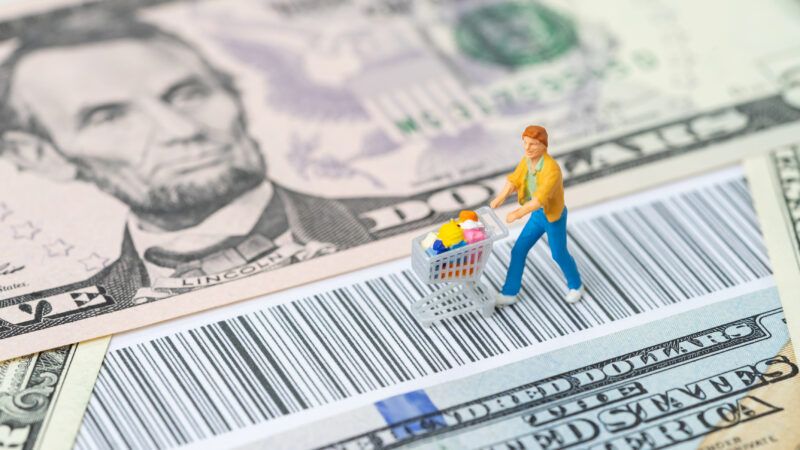Report: Trump's Proposed Tariff Would Cost Families $1,500 Annually
A 10 percent tariff on all imports would trigger more inflation at the grocery store, particularly for products such as fresh fruit and coffee.

Former President Donald Trump's plan to impose a 10 percent tariff on all imports to the United States would hike prices and cost the average American household $1,500 annually.
That's the sobering conclusion reached by a new economic analysis from the Center for American Progress (CAP) Action Fund, a left-leaning think tank and advocacy organization. The proposed tariff, which would be applied on top of existing tariffs according to Trump's campaign, would translate into $1,500 in higher costs for the average American household. That includes "a $90 tax increase on food, a $90 tax increase on prescription drugs, and a $120 tax increase on oil and petroleum products," according to Brendan Duke and Ryan Mulholland, the two economists who authored the report.
The 10 percent tariff is one of the few policy proposals that Trump has outlined in any detail as he campaigns for a return to the White House. Though he originally mentioned it in an offhand way during an interview with Fox News in August, Trump's campaign website now promises more tariffs as a "linchpin of a new Strategic National Manufacturing Initiative that will rebalance the global trading system and dramatically strengthen America."
Anyone who needs to buy groceries might discover a different reality. A 10 percent tariff, the CAP Action Fund report notes, would have a direct impact on food prices—which have already climbed significantly in recent years due to inflation—because 60 percent of the fresh fruit consumed by Americans is imported, as is 99 percent of all coffee and more than 70 percent of seafood.
Advocates for more tariffs frequently argue that imposing higher taxes on imported goods will help spur domestic production of those same goods. The evidence for that is pretty thin—but even if it were true, it wouldn't make a difference for foods that can't be grown or caught within the United States. (Sorry, but there's just no way to grow bananas in East Atlanta).
Consumers would have to pay higher taxes to consume imported food or go without it. That's an unappetizing choice.
"Consumers would likely buy fewer imported goods to avoid the tax, but that itself is a form of paying the tax," wrote Duke and Mulholland. "A family that switches from imported fresh berries to frozen domestic berries in the winter may purchase an untaxed item, but they are not purchasing their preferred form of berry and would experience a decline in living standard."
To make matters worse, the tariff would also raise the cost of producing food in the United States. That's because American farmers would face higher costs to obtain fertilizer and farm equipment, much of which is imported.
The CAP Action Fund analysis on Trump's proposed tariff is in some ways colored by partisan politics. The report attempts, unconvincingly, to suggest that President Joe Biden's efforts to boost American manufacturing with billions of tax dollars have been more successful than Trump's tariffs, when in fact both have pretty dismal track records.
But there is nothing partisan about the idea that higher tariffs would have an inflationary effect on prices for American consumers. That's an economic fact backed up by the empirical experience of the past several years. For example, the U.S. International Trade Commission's recent analysis of the tariffs Trump implemented in 2018 found that "U.S. importers bore nearly the full cost of these tariffs because import prices increased at the same rate as the tariffs."
The CAP Action Fund report also reflects what other estimates of Trump's 10 percent tariff plan have found. An analysis by the Tax Foundation estimates that it would raise taxes on Americans by more than $300 billion. The higher prices created by the tariff would rebound throughout the economy, translating into higher costs for businesses and consumers, shrinking economic growth, and diminished exports. "Taken together, we find Trump's proposal of a 10 percent trade tax matched with in-kind retaliation would shrink the U.S. economy by 1.1 percent and threaten more than 825,000 U.S. jobs," Erica York, a senior economist at the foundation, wrote in that report.
Adam Posen, president of the Peterson Institute for International Economics, a trade-focused think tank, told The Washington Post last year that a 10 percent tariff on all imports would likely raise America's inflation rate by more than two percentage points. In the same article, Casey B. Mulligan, who served as an economic adviser to the Trump administration, acknowledged that hiking tariffs would contribute to inflation.
In short, if you think grocery store prices should be even higher than they already are, Trump's tariff plan probably seems like a great idea. For everyone else, this should sound like a terrible idea.


Show Comments (120)